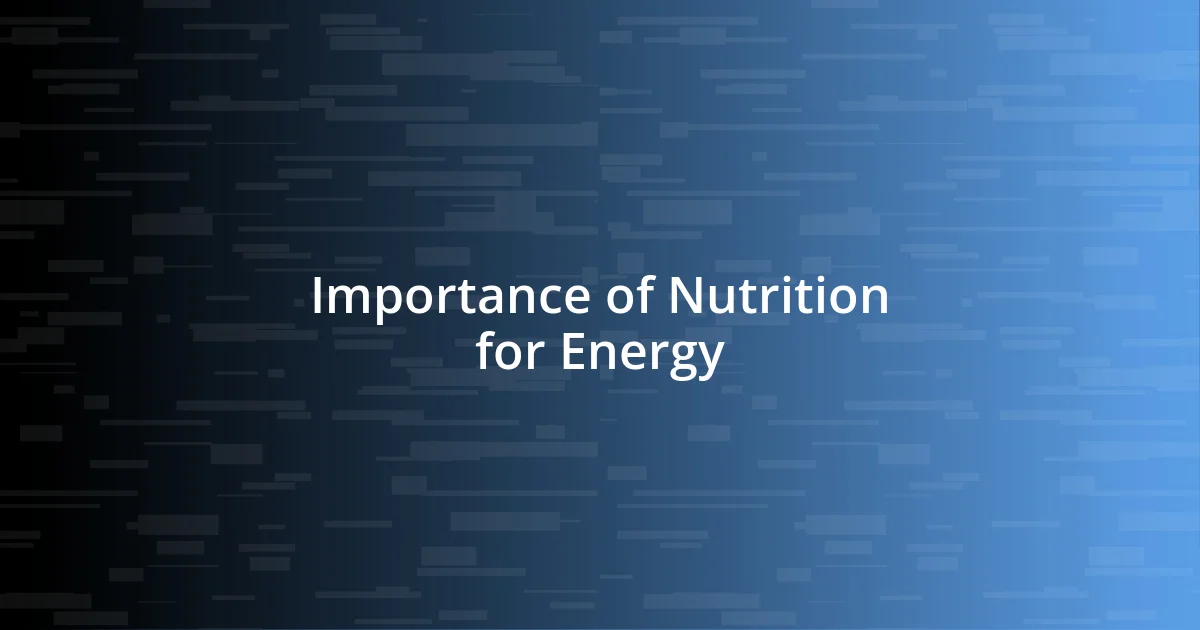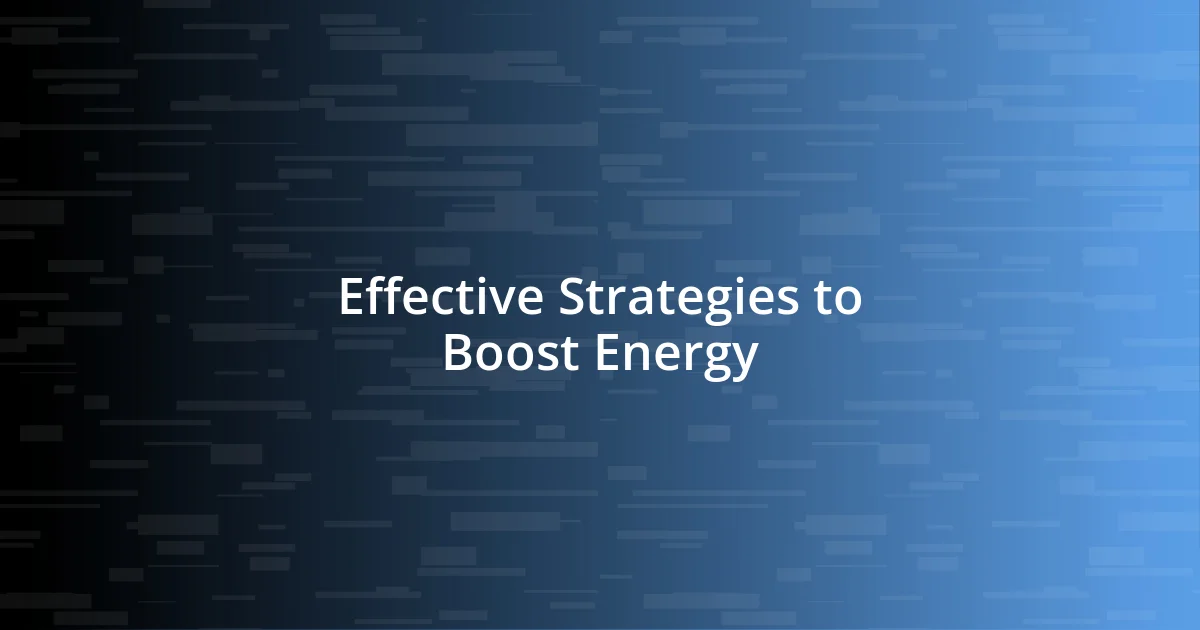Key takeaways:
- Energy levels vary throughout the day and are influenced by sleep quality, nutrition, and stress management.
- Nutrition is crucial for sustained energy, with complex carbohydrates, hydration, and nutrient-dense foods playing significant roles.
- Effective energy-boosting strategies include regular physical activity, prioritizing sleep, and practicing mindful breathing techniques.

Understanding Energy Levels
Energy levels can fluctuate throughout the day, influenced by various factors such as sleep quality, nutrition, and stress levels. I’ve noticed that when I skip breakfast, my energy often dips around mid-morning. Have you ever experienced that mid-day slump? It’s not just you; our bodies thrive on routine and the right fuel.
For me, understanding my energy levels means recognizing patterns. There are days when I feel like I could run a marathon, and others when a walk around the block feels daunting. It’s a dance between my mental state and physical needs. Have you taken time to observe your cycles? Paying attention can reveal what boosts or drains you.
It’s fascinating how our emotional health intertwines with our energy. I remember days when anxiety would sap my strength, leaving me drained despite getting plenty of rest. Have you felt your mood impact your vitality? Learning to manage stress through mindfulness or exercise has helped me maintain a more consistent energy level, and it might do the same for you.

Factors Affecting Energy Levels
Sleep quality is a fundamental factor defining how energized we feel each day. I’ve had nights where I only get a few hours of sleep, and the following day, dragging myself out of bed feels like an Olympic sport. Have you noticed that days following poor sleep often lead to irritability or fatigue? It’s amazing how much impact a restful night can have on our physical and mental stamina.
Nutrition is another critical piece of the energy puzzle. When I focus on wholesome meals rich in nutrients rather than quick fixes, I feel a noticeable difference in my overall energy throughout the day. It’s frustrating to realize that those sugary snacks might give a short buzz, but the crash that follows can leave us feeling worse. Have you tried keeping a food diary to see how different foods affect your mood and vitality?
Stress management practices also play a significant role in how energized we feel. I recall a particularly stressful week where deadlines loomed, and my usual yoga routine fell by the wayside. Suddenly, my energy felt depleted. Have you found that certain strategies help you combat stress? I’ve since embraced mindful breathing and regular breaks, and I’ve observed it’s like a reset button for my energy levels. Find what works for you; it can turn your day around.
| Factor | Impact on Energy Levels |
|---|---|
| Sleep Quality | Affects mood and physical stamina; poor sleep leads to fatigue |
| Nutrition | Balanced meals sustain energy; sugary snacks cause crashes |
| Stress Management | High stress depletes energy; mindfulness can help boost levels |

Importance of Nutrition for Energy
Nutrition plays a pivotal role in how energized we feel daily. I remember a time when I made a conscious effort to include more whole grains and lean proteins in my diet. The shift not only kept my energy stable but also seemed to lift my mood. This made me realize how our food choices are not just about sustenance but a powerful way to influence our vitality.
To put this into perspective, here are some key reasons why nutrition is essential for energy levels:
- Sustained Energy: Complex carbohydrates release energy gradually, keeping you energized longer.
- Nutrient-Rich Foods: Vitamins and minerals from fruits and vegetables support cellular functions that enhance energy production.
- Hydration Matters: Dehydration can sap your energy, making it crucial to drink enough water throughout the day.
- Protein Power: Including protein in meals helps maintain muscle mass and increases overall stamina.
- Mind-Body Connection: Eating nutritious foods can positively affect your mood, which in turn influences your energy levels.
When I indulge in quick snacks, I often find a rollercoaster of energy highs and lows. A handful of nuts or a piece of fruit instead can keep me balanced. Have you noticed how certain foods make you feel? It’s a wake-up call to prioritize nutrient-dense options. The right nutrition fuels not just our bodies but also our spirits, creating a more vibrant life.

Best Foods for Sustained Energy
One of my go-to energy boosters is oatmeal. When I start my day with a bowl topped with berries and nuts, I can feel the difference. It’s the complex carbohydrates that provide slow-releasing energy, preventing me from crashing before the morning is over. Have you ever experienced a morning fog after a sugary breakfast? Those moments made me take a hard look at my choices.
Then there’s the power of leafy greens. Incorporating spinach or kale into my meals has been a game changer. I often toss some into my smoothies or salads, and I can swear I feel more alert. The vitamins and minerals from greens support my energy production, making it a simple yet effective addition. What about you? Have you tried sneaking in more vegetables into your meals?
Finally, let’s not forget about the magic of beans and legumes. They’re versatile, packed with protein, and help keep me full longer, so I don’t find myself reaching for those unhealthy snacks. I remember when I made a hearty black bean chili—it was not only delicious but left me feeling satisfied and energized for hours. How do you feel when you fuel your body with wholesome, nourishing foods? It’s fascinating to see how small changes can elevate your energy levels throughout the day.

Role of Hydration in Energy
Hydration plays a crucial role in how I experience energy throughout the day. When I forget to drink enough water, I often feel sluggish and unfocused, like my body and brain are running on empty. It’s surprising how something as simple as a glass of water can bring clarity and alertness back into focus, don’t you think?
I recall a moment during a particularly busy workweek when I felt fatigued and couldn’t pinpoint why. After some reflection, I realized I hadn’t kept up with my water intake. Simply making a point to sip regularly transformed my energy levels—I remember feeling revitalized after just a couple of hours. It’s a good reminder that our energy isn’t just about what we eat but also how well we hydrate.
Moreover, I’ve always found it interesting that even mild dehydration can impact mood and cognitive function. I remember that time I got a headache because I’d only had coffee and forgot to drink water. The frustration I felt was palpable, and it became evident that the effects of hydration seep deeper than mere physical lethargy. How often do we overlook our water consumption, thinking it won’t affect our overall performance? It’s a small yet significant aspect that deserves our attention for optimal energy levels.

Effective Strategies to Boost Energy
Finding effective strategies to boost energy is often about discovering simple, actionable habits that work for me. For instance, integrating short bursts of physical activity into my day has been transformative. If I feel my energy dipping around mid-afternoon, I’ll take a quick walk or do some light stretching. It’s amazing how just a few minutes of movement can rejuvenate my mind and body. Have you ever felt that immediate lift after a little exercise?
I’ve also learned the importance of prioritizing sleep. It may seem obvious, but I can’t stress enough how a consistent sleep schedule has positively influenced my energy levels. There was a time when I was staying up late scrolling through my phone, which left me groggy the next day. By turning off my screens an hour before bed and sticking to a regular sleep routine, I’ve seen a noticeable boost in my alertness and focus. What changes could you make to your evening habits for better sleep?
Lastly, I find that mindful breathing techniques can be surprisingly energizing. Whenever I feel overwhelmed or fatigued, taking a moment to practice deep breathing helps clear my mind. I remember sitting in a meeting feeling drained, and I paused for a minute to focus on my breath. It was as if a fog lifted, allowing me to engage and respond more effectively. Have you given yourself a chance to pause and breathe deeply during a hectic day? The impact can be more profound than we often realize.














